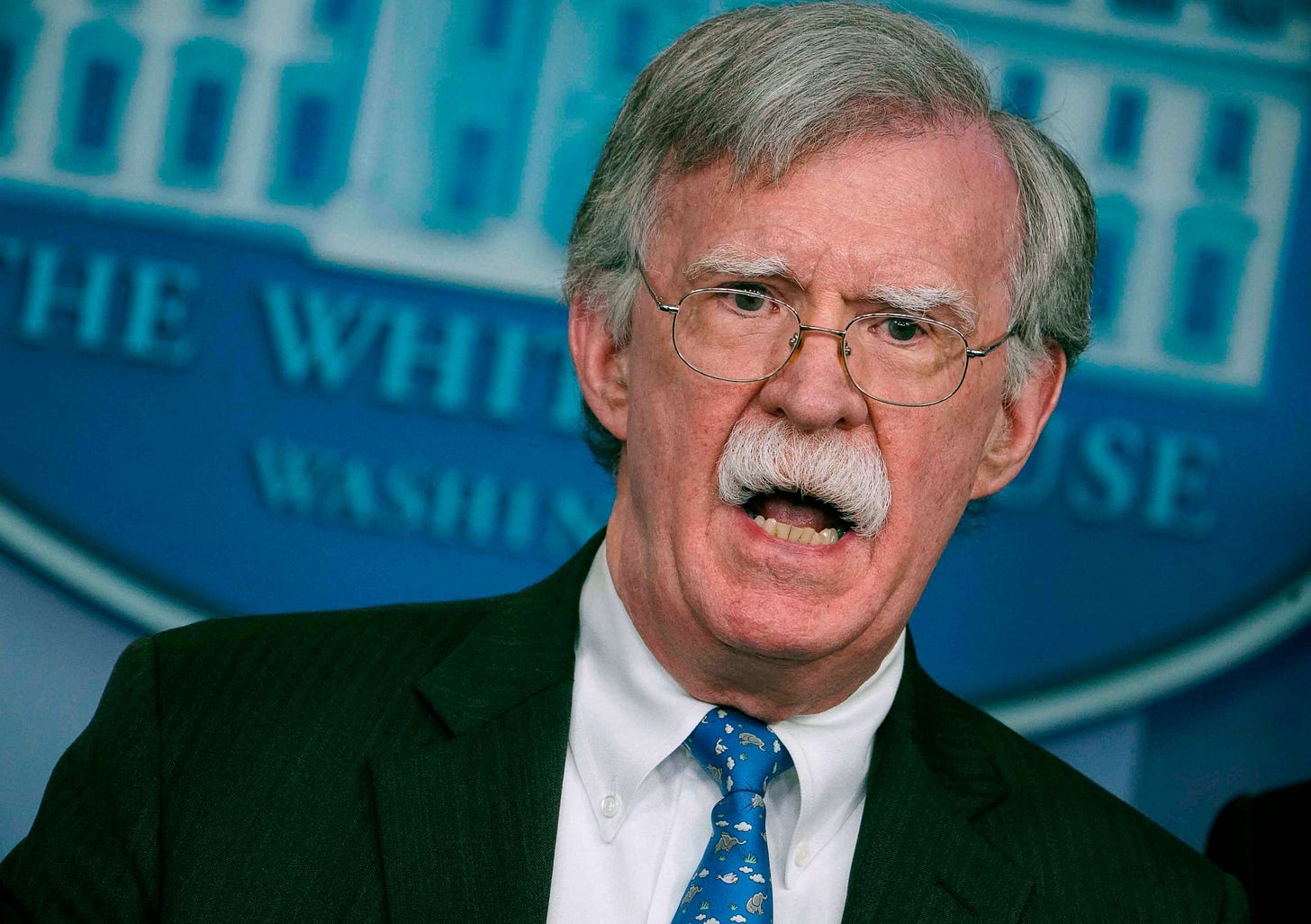Trump's Assault on the Justice System Continues
Punish your enemies, protect your friends - Part II
In my most recent post, I wrote about Trump’s escalating weaponization of the Department of Justice. Consider this part 2 of that post. Trump continues to use the justice system to punish his enemies and reward his friends, and to trample on the rule of law in the process.
Trump regularly complains that the justice system was weaponized against him because it dared to seek to hold him accountable for his criminal acts. One of the many ironies of the Trump era is that it is Trump himself who has weaponized the justice system, in ways that would have been unthinkable in any prior administration.
Trump’s corruption of the Department of Justice is causing tremendous damage. But there are still some guardrails, some reasons for hope, and some reminders that Trump is not in fact all-powerful.
The Comey and James Indictments
In my prior post I discussed how Trump had forced out Erik Siebert, the respected career U.S. Attorney in the Eastern District of Virginia, because he refused to follow Trump’s public commands to indict former FBI director James Comey and New York Attorney General Letitia James. Trump then installed Lindsey Halligan, one of his personal attorneys with zero experience as a prosecutor, as the head of one of the country’s most important U.S. Attorney’s offices. As I noted at the time, Halligan’s primary qualification appeared to be a willingness to do whatever Trump wants her to do.
Halligan wasted no time demonstrating those qualifications. Within a few days of her appointment, and just days before the statute of limitations would have expired, she obtained an indictment of Comey for lying to Congress and obstruction of justice based on his testimony in a Congressional hearing in 2020. Two weeks later Halligan indicted James for mortgage fraud, based on a claim that she falsely said in mortgage paperwork that a property she purchased would be used as her personal residence.
As many commentators have noted, both cases appear laughably thin. The indictments are bare bones allegations, not the detailed “speaking indictments” that real prosecutors typically prepare in significant white collar cases. In both cases Halligan apparently had to present the evidence to the grand jury herself because the career prosecutors in her office refused to participate.
Even if the government can prove misstatements in Comey’s testimony or in James’s loan paperwork (which is far from clear), proving criminal intent in both cases will be extremely difficult. There are many legal issues and potential defenses in these types of cases. Mistake, confusion, failures to recall, inconsistent paperwork - none of these are crimes. As the career prosecutors in Virginia had concluded, given these slim facts, these are not matters the Justice Department typically would pursue.
These cases may never make it to trial. The defense will certainly file motions to dismiss for vindictive or selective prosecution, and Trump’s own actions give them a compelling case. Defense attorneys also intend to challenge the legality of Halligan’s appointment. If the cases do go to trial, prosecutors will need to prove beyond a reasonable doubt to a unanimous jury that the defendants knowingly and intentionally lied or committed fraud. I frankly would be shocked if either case ends up in a criminal conviction.
That does not, of course, negate the harm to these defendants. Simply being indicted causes tremendous emotional, reputational, and financial injury. And that is precisely the point: Trump wants to use the criminal justice system to inflict pain on his political foes, and Pam Bondi and his other lackeys in the Justice Department are willing to help him.
Trump has a long list of perceived enemies, and other “revenge prosecutions” are probably coming. I hate to sound like a broken record, but using criminal prosecution to go after the leader’s political opponents is textbook authoritarianism. It’s a violation of everything that DOJ has stood for. In a statement following his indictment, Comey said: “My heart is broken for the Department of Justice.” That’s exactly how I and most of his other former colleagues feel.
The Bolton Indictment
Last Thursday John Bolton became the third Trump antagonist to face criminal charges. Bolton served as National Security Advisor in Trump’s first term, but after leaving the administration became a vocal Trump critic. He was indicted on eighteen counts of improperly retaining and transmitting national defense information. Prosecutors allege Bolton improperly retained classified information in his home and transmitted it, in the form of his personal diary entries, over non-secure email accounts to family members not authorized to have the information. Some of those emails allegedly were obtained by Iranian hackers.
Former Trump National Security Advisor John Bolton
Many, including Bolton himself, were quick to claim this was another example of a Trump critic being punished with an indictment. It’s true that Trump has repeatedly attacked Bolton and that the White House apparently was pushing for this case to be brought. But there are some important distinctions between the Bolton case and the cases against Comey and James.
The Bolton investigation was begun several years ago by the Biden Justice Department, not initiated by a Trump social media rant. The indictment was obtained and is signed by career prosecutors from both the Maryland U.S. Attorney’s Office and the National Security Division of the Justice Department. A judge previously signed off on a search warrant of Bolton’s home, finding probable cause there was evidence of a crime. The 26-page indictment goes into great detail about the alleged criminal violations and is much more typical of an indictment in a significant white collar case. The allegations appear to be serious and to state real crimes.
None of that means the Bolton prosecution will succeed. But I wouldn’t automatically lump it into the same category as the indictments of Comey and James. We need to be cautious about a knee-jerk reaction where any indictment of a Trump critic is automatically considered improper. That’s just the flip side of what Trump does: assume that any case against him must by definition be illegitimate.
But this is precisely the problem with what Trump is doing. Defendants in politically-charged cases have always claimed their prosecutions were witch hunts brought by political foes. Those claims historically lacked credibility because of DOJ’s independence and its track record of pursuing corruption cases without regard to politics.
Now Trump’s actions are making those kinds of claims plausible. When a defendant says he is being prosecuted for political reasons, why shouldn’t the public – and the jury – believe it? After all, we’ve now seen it happen in other cases. Even if the Bolton case is completely legitimate, Trump’s public targeting of his enemies casts a cloud over the prosecution and makes it suspect from day one. That lack of Justice Department credibility will carry forward into future prosecutions and even future administrations.
The George Santos Case
On the “reward your friends” side of the ledger, Trump has once again exercised his power of Executive clemency to benefit a political ally, with no regard for the merits of the prosecution. George Santos, the disgraced former Republican Congressman and serial liar, was convicted of fraud and identity theft. He admitted to stealing money from campaign supporters by using their credit cards for personal expenses such as designer clothing and Botox injections. He also admitted falsifying campaign finance reports to qualify for funds from a Republican campaign committee.
Regular readers know we followed the Santos case on Sidebars in some detail. If you want a refresher on the case and the charges, you can find links to some of my earlier posts here:
Santos is a Republican and a die-hard Trump supporter. He had only served three months of his seven-year sentence when Trump decided last week to commute his sentence and release him from prison. Trump claimed the admitted fraudster was just a bit of a “rogue” and had been treated unfairly. He also praised Santos for having “the Courage, Conviction, and Intelligence to ALWAYS VOTE REPUBLICAN.”
A primary victim of Santos’s fraud was a Republican campaign committee. About a hundred Republicans joined in voting to expel him from Congress. None of that mattered. Santos is a Republican, a Trump supporter, and a white collar criminal. In Trump’s mind, by definition that means he must have been treated unfairly.
Trump loves the clemency power because it is his alone and is completely unreviewable. No doubt it makes him feel very powerful and important. But he has no appreciation or respect for the proper role of that power. Granting clemency to Santos is an outrageous act, one that will further erode the public’s faith in the rule of law. There’s no indication that Santos’s prosecution, guilty plea, and sentencing were unfair or unjustified.
When it comes to justice there is one set of rules for Trump and his allies, and another set of rules for everyone else. Again, nothing could be more antithetical to the justice system as we have known it.
The Damage Being Done to DOJ
There was also news last week that following the indictment of Letitia James, the Justice Department fired a supervisor in the Virginia U.S. Attorney’s Office who had concluded there was no basis to bring the case. One of her deputies was also fired.
This is just the latest in a long line of examples of career people at DOJ who refuse to toe the Trump line being fired or forced to resign. Trump’s Justice Department is gradually purging good career prosecutors and replacing them with loyalists like Halligan.
This is obviously a big problem for the Justice Department as an institution. It is losing people with decades of experience in prosecuting important, complex cases and replacing them with people whose primary qualification is slavish devotion to Trump. This brain drain is going to matter when DOJ is dealing not with show prosecutions like Comey and James but with real, serious cases involving defendants who seek to harm the United States. The Justice Department is purging the people with the institutional knowledge and practical experience to handle those cases. The country will suffer as a result.
In addition to losing people, DOJ is losing its credibility. The government has long enjoyed what is known as a “presumption of regularity.” Courts generally presume, absent clear evidence to the contrary, that government officials have properly discharged their duties. Courts also presume that government attorneys are acting in good faith and that their representations to the court can be trusted.
That hard-won reputation before the judiciary is a tremendous advantage for the government. When I was a federal prosecutor, my colleagues and I took the responsibility that came with the presumption of regularity very seriously. When you stood before a judge and announced you were appearing on behalf of the United States, you understood the obligation to be completely up front with the court. You knew your credibility was your most important professional asset and that you were responsible not only for your own credibility, but for the government’s.
The Trump administration is squandering that as well. The folks at Just Security have collected a long series of examples where courts have found that the Trump administration has failed to follow court orders, where attorneys have misrepresented facts, or where officials have failed to exercise their duties in good faith.
The presumption of regularity that was built up by generations of government attorneys has been wrecked by the Trump administration in less than a year. That’s a harm that extends not just to the Justice Department, but government-wide.
Still Some Guardrails
So yes, everything is awful. But we did see another example last week of the guardrails that still stand in Trump’s way as he attempts to corrupt the criminal justice system. On Thursday a D.C. federal jury found Sidney Reid not guilty of a misdemeanor charge of assaulting, resisting, or impeding a federal officer. It took the jury only two hours to reach a verdict following a three day trial.
The D.C. U.S. Attorney’s Office, headed by former Fox News celebrity Jeanine Pirro, had filed the misdemeanor charge (which does not require grand jury action) after it failed three times to get a grand jury to indict Reid on felony charges - itself a remarkable and humiliating event.
And after all that, the office couldn’t even convict Reid of a misdemeanor.
After her acquittal, Reid issued a statement:
Grand juries, judges and trial juries still stand as important safeguards against Trump’s abuses. Judges with life tenure, largely insulated from Trump’s wrath, will review the legal merits of cases such as those filed against Comey and James. Trial juries will have the ultimate word on whether prosecutors have proved their case beyond a reasonable doubt.
In the wake of the massive “No Kings” protest this past weekend, the Reid verdict is an important reminder that Trump is not all-powerful. His sycophants may be able to get an indictment (or, failing that, file misdemeanor charges), but he still can’t unilaterally convict someone or throw them in jail. The Republican Congress may have completely abdicated its role in the separation of powers, but the judicial branch and our Constitution and Bill of Rights still offer resistance.
As Reid said, despite the scary times we live in, that gives us some hope for the future.






I disagree-but even if true it's just what they did to him and his friends etc., except this time there is substance for the charges!